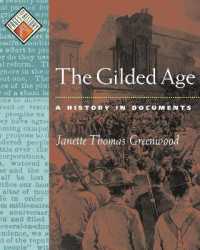- ホーム
- > 洋書
- > 英文書
- > Politics / International Relations
Full Description
Americans valorize resistance to conformity. "Be yourself!" "Don't just follow the crowd!" Such injunctions pervade contemporary American culture. We praise individuals such as Martin Luther King Jr. and Steve Jobs who chart their own course in life and do something new. Yet surprisingly, recent research in social psychology has shown that, in practice, Americans are averse and at times, even hostile to individuals who express traits associated with non-conformity, such as individuality, free judgment, and creativity. This disjunction between our public rhetoric and practice raises fundamental questions: Why is non-conformity valuable? Is it always valuable-or does it pose dangers as well as promise benefits for democratic societies? What is the relationship between non-conformity as an individual ideal and democracy as a form of collective self-rule?
Contesting Conformity provides a new interpretive lens to the writings of Alexis de Tocqueville, John Stuart Mill, and Friedrich Nietzsche to investigate non-conformity and its relationship to modern democracy. While there are important differences among them, all three thinkers worry that certain aspects of democracy--namely, the power of public opinion, the tyranny of social majorities, and the commitment to moral equality--encourage conformity, thus suppressing dissent, individuality, and creativity. Taken together, Tocqueville, Mill, and Nietzsche show us that to the extent that we are committed to democracy, we must find ways to foster non-conformity, but we must do so within certain moral and political constraints.
Drawing new insight from their work, Jennie Ikuta argues that non-conformity is an intractable issue for democracy. While non-conformity is often important for cultivating a just polity, non-conformity can also undermine democracy. In other words, democracy needs non-conformity, but not in an unconditional way. This book examines this intractable relationship, and offers resources for navigating the relationship in contemporary democracies in ways that promote justice and freedom.
Contents
Chapter One: Non-Conformity in American Public Life
Chapter Two: Countering Conformity Through Intellectual Freedom in Tocqueville's Democracy in America
Chapter Three: Contesting Conformity Through Individuality in Mill's On Liberty
Chapter Four: Refusing Conformity Through Creativity in Nietzsche
Conclusion







